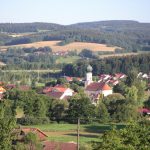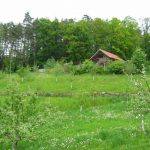Ascha, Bavaria, Germany
The municipality of Ascha is situated in the Kinsach Valley, a side arm of the river Danube, where the fertile soil turns into the Bavarian Forest. It runs along the Czech border, southeast of Regensburg, north of Straubing and Norwest of Deggendorf. Ascha has some 1,500 inhabitants and comprises the localities Geschwent,Willerszell and a further 24 little villages and individual farms. The population has increased by 35 percent during the past 20 years, while at the same time a 50 percent increase in work places could be recorded. The increase affects mostly the craft trade (+15 businesses), commerce (+32 businesses) and the service industry (+31 businesses).
The development process in Ascha had been initiated in 1989 when the citizens of the municipality protested against a planned landfill site in the Spitalwald Woods. This new sense of responsibility strengthened the consciousness for environment and sustainability and made the citizen to engage themselves in work groups for the renewal of the villages and later on, the Agenda 21. The persons concerned turned into concerned participants.
The definite highlights and continuous principles of village development are the responsible handling of resources and the use of renewable raw materials. The incentive for environment-friendly construction activities using passive solar energy were created and innovative and efficient energy saving actions were implemented. Main energy source was heat from chipped woods, a citizen solar plant on the roof of the multiple-use municipality hall, sun collectors for the hot-water heating system, which was purchased jointly and therefore cost-effectively, and a bio gas plant. Interim result: Energy consumption could be reduced by 44 percent since 2001 and 86 percent of the consumed energy and a third of the used heat are covered by renewable raw materials, resulting in yearly savings of approximately 3,300 t of CO2.
Ascha also saves resources in the area housing development. This is manifested in an exemplary surface management, aimed at consolidation and environment-friendliness. In the core of the locality, the housing estate „Am Mühlbach“ is under development after an industrial business had been relocated to the outskirts. The new development is characterized through space saving, village-type apartments and single and multiple family dwellings at low cost with a neighbourly style of living. It also includes service businesses. The housing estate Deglholz also deserves to be mentioned in this context, since it meets highest ecological standards and rewards environment-friendly construction projects. In addition, a number of projects can be pointed out as success ful examples for optimized use of space: the old school was turned into the council house, a former restaurant is now a training centre for renew able raw materials and a reconstructed Troid building in the training garden is now the home of an association.
Ascha presents itself as an attractive location for businesses. Businesses are interlinked and also connected to agriculture. The local farmers commit themselves to not using genetically modified food stuff and to conserve the man-made landscape as it is. They engage into direct marketing through farmer markets and farmer shops and sell their wood in the biomass plant initiated by them. Social and cultural life is important for the community. All population groups of all ages are included. Activities are manifold and comprise Kindergarten and other valuable social facilities and a group for the elderly. Everybody knows how to celebrate, engage in charity and an ecological education in schools and Kindergarten are enforced. There is an apiary, a training garden, and attractive recreational facilities. A pronounced citizen participation culture, promoted and guaranteed by the respective structures is another plus for the high quality of life in Ascha and the proof that the motto „Win the future through social innovation“ is actually realised.
Evaluated: 2008




